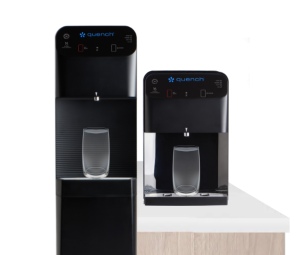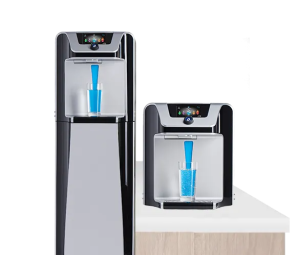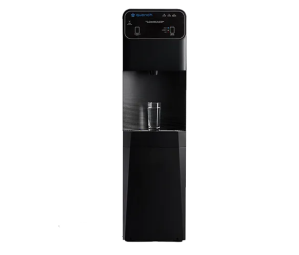
Can dehydration cause anxiety?
It’s widely recognized that drinking enough water is an essential element in maintaining health — both mentally and physically. Despite this awareness, a majority of Americans are dehydrated, which can have a considerable influence on how anxious your workforce feels throughout the day.
With a host of health repercussions at stake, we’re taking a closer look at the relationship between water intake and anxiety levels and the ramifications they can have on employee well-being and your bottom line.
Is there a connection between dehydration and anxiety?
Anxiety puts a considerable strain on mental well-being, and it’s becoming increasingly common among the U.S. population. Research from Anxiety Centre reports that approximately 33.7% of Americans today will have an anxiety disorder at some point in their lives — with some researchers projecting this number closer to 50%. These feelings of anxiety can lead to symptoms that trigger a panic attack, such as:
- Headaches
- A fast, thumping, or irregular heartbeat (i.e., a heart palpitation)
- Weak muscles
- Feeling light-headed or dizzy
- Nausea or vomiting
- Feeling restless or unable to sit still
When considering the root of the problem, several factors contribute to anxiety and anxiety symptoms, but dehydration can be a critical underlying cause. So, if you’ve been wondering if there’s a link between staying hydrated and minimizing anxiety in your workplace, the short answer is, yes. This comes from a study of over 3,000 adults that found drinking water can help lower your risk of anxiety and depression. But how exactly does this affect your workforce and, ultimately, your business results?
The consequences of dehydration and anxiety
Whether we realize it or not, anxiety symptoms both mild and severe can have a significant effect on our mental health and overall well-being. That means valued team members who fail to maintain proper hydration throughout the workday are not only more likely to experience anxiety but also a host of health repercussions, including:
- Decreased brain function: Chronic dehydration and intensified anxiety impair the cognitive abilities of your teams, including reducing focus, concentration, and memory retention. As a result, workplaces can expect drops in productivity, which can increase feelings of distress.
- Increased irritability and mood swings: Mood stability and resilience in the face of the unknown can depend highly on fluid intake. Increased irritability and a decreased tolerance for stressors negatively sway workplace relationships and communication.
- Physical discomfort and headaches: Employees that don’t drink enough water at work can see mild to severe dehydration manifest in a range of physical symptoms like dry mouth, dizziness, and headaches. These discomforts not only distract team members, but also cause additional workplace stress.
- Decreased overall health: Increased anxiety at the hands of dehydration has sizable ramifications on the long-term health of your team members. This may include kidney problems, urinary tract infections, digestive issues, and unstable blood pressure and blood flow — to name a few.
Boosting workplace hydration
As workplaces recognize the true impact of insufficient fluid intake and the anxiety that can result, it’s critical for employers to consider hydration initiatives that promote a healthier and more productive work environment. Here are some of the most common strategies organizations are implementing to drive hydration at work:
- Encourage reusable water bottles: Incentivizing employees to bring their own reusable bottles to work can be a boon to your workplace’s hydration and sustainability efforts. While the U.S. still leads bottled water consumption globally, research from Brand Essence reports that one reusable bottle can save 156 plastic bottles each year. It’s important to provide designated areas for refilling containers to support the use of eco-friendly alternatives.
- Introduce water intake reminders: Sometimes, employees are dehydrated because they’ve simply forgotten to drink water all day. Employers can set up reminders to drink water regularly by establishing hydration alerts or sending out periodic emails.
- Educate on the benefits of hydration: Conducting awareness campaigns or workshops to educate team members about the benefits of staying hydrated — not to mention the potential consequences of dehydration and anxiety — can help your organization recognize why they need to monitor and improve water intake daily.
- Opt for a bottleless water dispenser: With a bottleless water cooler from a dependable service provider like Culligan Quench, you can ensure access to a limitless supply of fresh, filtered drinking water that facilitates greater hydration and reduced anxiety. These modern systems with cutting-edge filtration technology are a convenient, cost-effective, and sustainable drinking water solution for organizations across industries.
Support your employees’ well-being with a bottleless water cooler
With a bottleless water cooler from Culligan Quench, you can provide clean, great-tasting water that supports the health of your team members, regardless of your area’s local water quality. Ready to help your employees, guests, and customers boost water intake and better manage the mental and physical symptoms of anxiety? Try our product finder to discover the machine that’s the right fit for your business, or get a free quote to get started.
Recommended products
Culligan Quench has an advanced suite of bottleless water cooler models that are designed to meet the needs of hotels of all shapes and sizes. Bottleless water coolers can be placed throughout your property for staff and guest filling.
Q8 Touchless Bottleless Water Cooler
Available with quenchWATER+ electrolyte water

Q10 Bottleless Water Cooler With Sparkling Water
Includes Firewall® UV Protection

Q12 Touchless Bottleless Water Cooler
Available with quenchWATER+ electrolyte water